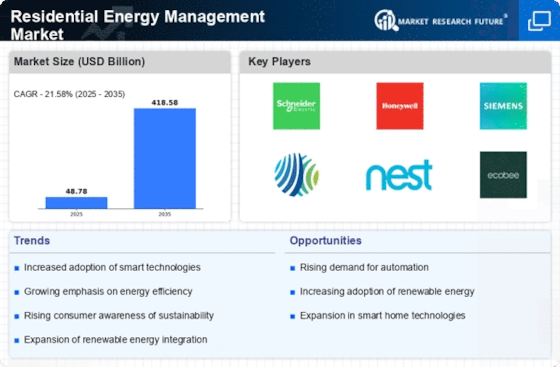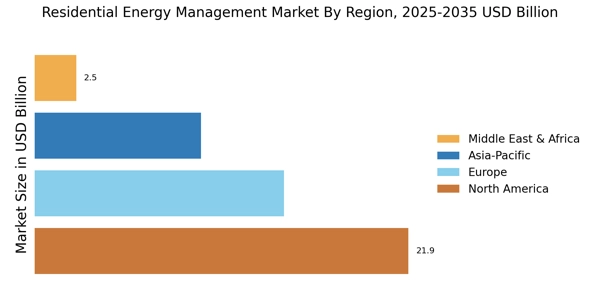Rising Energy Costs
The escalating costs of energy are a primary driver for the Residential Energy Management Market. As households face increasing utility bills, there is a growing impetus to adopt energy management solutions that can optimize consumption. Reports indicate that residential energy prices have risen significantly over the past few years, prompting consumers to seek ways to reduce their energy expenditures. This trend is likely to continue, as energy prices are projected to rise further due to various factors, including supply chain disruptions and increased demand. Consequently, the Residential Energy Management Market is experiencing heightened interest from consumers looking for cost-effective solutions to manage their energy usage more efficiently.
Growing Environmental Concerns
Increasing awareness of environmental issues is driving the Residential Energy Management Market. As climate change and sustainability become pressing global challenges, consumers are more inclined to adopt energy-efficient practices and technologies. The demand for solutions that reduce carbon footprints and promote renewable energy sources is on the rise. Reports indicate that a significant portion of consumers is willing to invest in energy management systems that align with their environmental values. This shift in consumer behavior is likely to propel the growth of the Residential Energy Management Market, as more households seek to contribute positively to environmental sustainability.
Government Incentives and Regulations
Government policies and incentives play a crucial role in shaping the Residential Energy Management Market. Various governments have introduced programs aimed at promoting energy efficiency and the adoption of smart technologies in homes. These initiatives often include tax credits, rebates, and grants for homeowners who invest in energy management systems. For instance, certain regions have reported a surge in the installation of smart meters and energy-efficient appliances due to favorable government policies. Such regulatory frameworks not only encourage consumer participation but also stimulate market growth, as they create a conducive environment for the proliferation of energy management solutions.
Integration of Renewable Energy Sources
The integration of renewable energy sources into residential energy systems is a key driver for the Residential Energy Management Market. As more homeowners install solar panels and other renewable energy technologies, there is a growing need for effective energy management solutions that can optimize the use of these resources. Data indicates that the number of residential solar installations has increased substantially, leading to a greater demand for systems that can manage energy production and consumption efficiently. This trend is expected to continue, as advancements in energy storage technologies and grid integration further enhance the viability of renewable energy in residential settings, thereby stimulating the Residential Energy Management Market.
Technological Advancements in Energy Management
Technological innovations are significantly influencing the Residential Energy Management Market. The advent of advanced energy management systems, including smart thermostats, energy monitoring devices, and home automation technologies, has transformed how consumers manage their energy consumption. These technologies enable real-time monitoring and control of energy usage, leading to more informed decision-making. Data suggests that the integration of artificial intelligence and machine learning in energy management systems is enhancing their efficiency and effectiveness. As these technologies continue to evolve, they are likely to drive further adoption within the Residential Energy Management Market, as consumers seek smarter solutions to optimize their energy use.

















